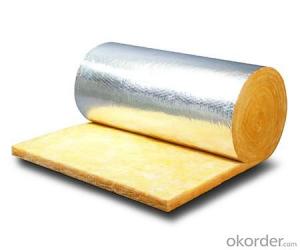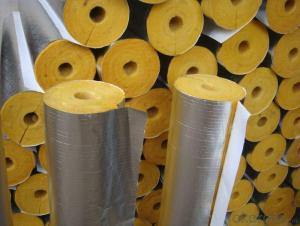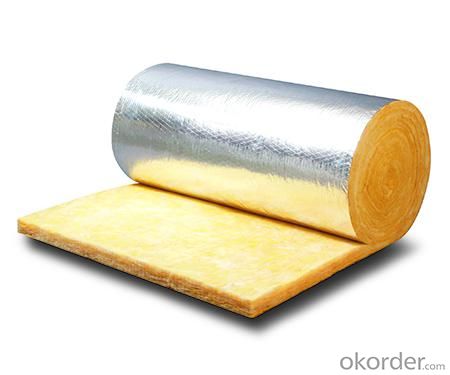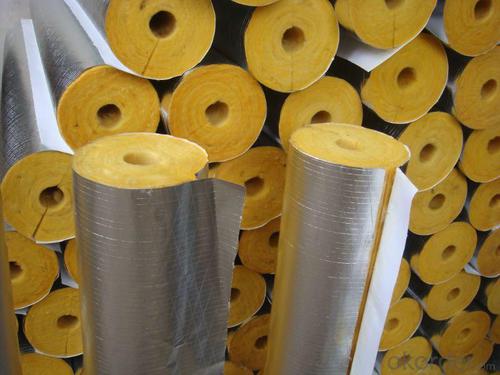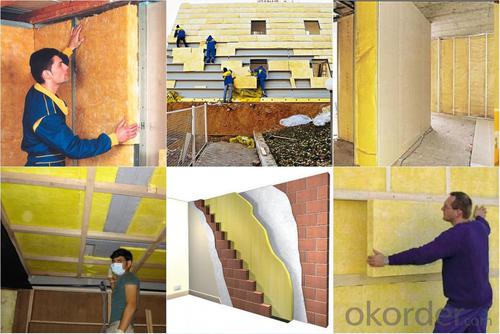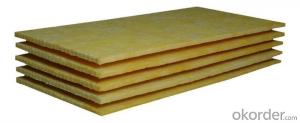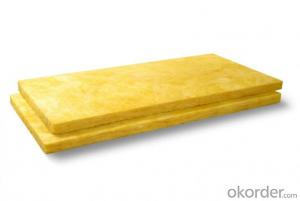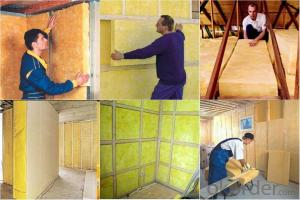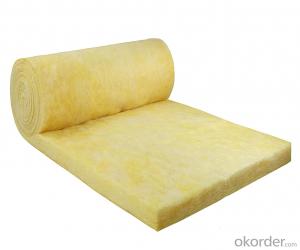Fiberglass Mat Tissue Glass Wool Home Insulation Product with CE
- Loading Port:
- Tianjin
- Payment Terms:
- TT OR LC
- Min Order Qty:
- 5000 m²
- Supply Capability:
- 20000 m²/month
OKorder Service Pledge
OKorder Financial Service
You Might Also Like
1.Description of Glass Wool Blanket:
Glass wool, which belongs to glass fiber , is a kind of man-made inorganic fiber. It is made from fibrosis glass melt in wool shape, which belongs to inorganic fiber and fiber in its chemical ingredient. Its merit is better in shape, low density and volume, low in thermal conduction, better heat preservation and thermal insulation, fine sound absorption, corrosion-resistant and stable chemical property. At the system HOT END, the raw materials are dosed, mixed, melted, fiberized, impregnated with a special binder and formed into a primitive mat of very fine fiber glass. Continuous conveyors transport the mat to the COLD END of the plant for binder polymerization. The product is then cut to shape and packed for shipping.
2.Main features of Glass Wool Blanket:
g):ventilation property
Glass wool, with multiaperture structure and special prescription, make its better performance in ventilation property. It contribute to moisture diffusion indoor and wall and greatly decrease the possibility of leaf mold growth. Thus it can help to increase service life of building and indoor comfort level.
h): Hydrophobicity
Hydrophobicity glass wool in panel wall bears 99% Hydrophobicity rate. It can easily get dry naturally, which ensure its long-term heat preservation perporty.
i): Light in weight
Glass wool bears good heat preservation and soundproofing property. It’s low density product can meet energy saving requirement. Thus it helps to decrease the weight of building and makes the construction more expedite.
3.Glass Wool Blanket Images:
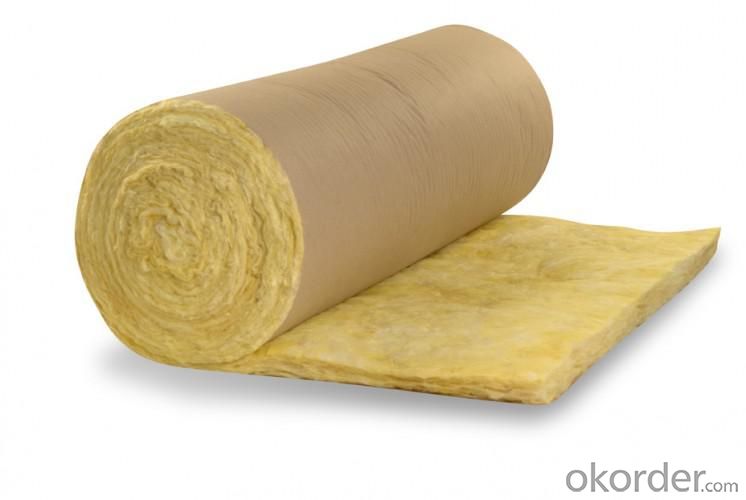
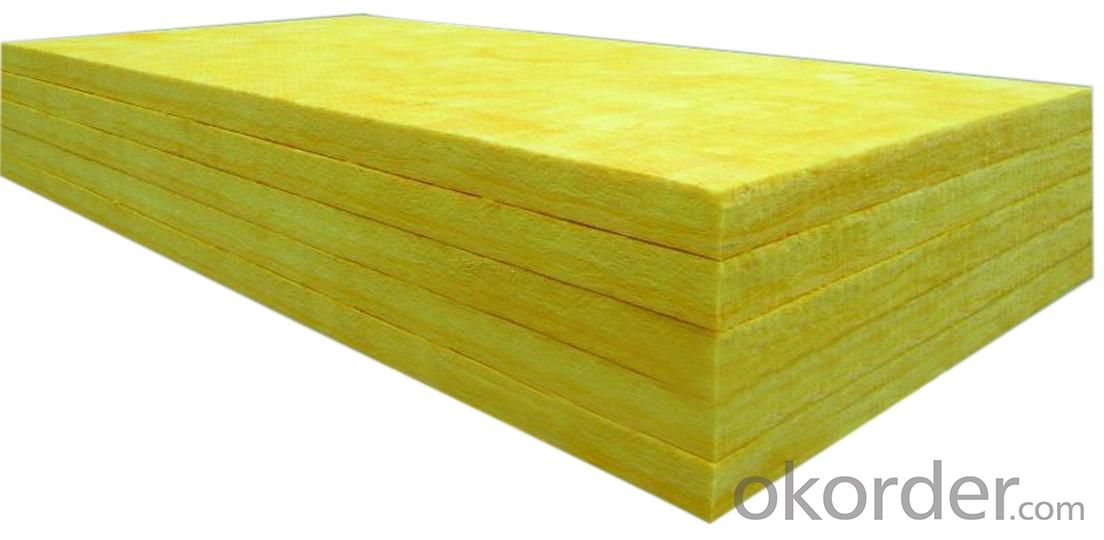
4. Glass Wool Insulation Blanket Technical Parameters:
Property | High/low temperature resistance, oil and fuel resistance, weathering resistance, O zone resistance etc. |
Shape | According to your requirement. |
Color | Any color is available ,according to your requirements. |
Material | NBR, CR, SBR, EPDM, IIR, NR, EP, Silicone, VITON etc. |
Hardness | 30-90ShoreA |
Delivery | In 10 days |
Packing | Plastic bag & carton box or according to your requirements. |
Application | Electronic field, industrial machine & equipment, house-hold appliance, telecommunication, automobile, medical equipment industry etc. |
5.FAQ
We have organized several common questions for our clients,may help you sincerely:
①How about your company?
A world class manufacturer & supplier of Glass Wool Blanket is one of the large scale professional investment casting production bases in China,consisting of both casting foundry forging and machining factory. Annually more than 8000 tons Precision casting and forging parts are exported to markets in Europe,America and Japan. OEM casting and forging service available according to customer’s requirement.
②How to guarantee the quality of the products?
We have established the international advanced quality management system every link from raw material to final product we have strict quality test; We resolutely put an end to unqualified products flowing into the market. At the same time, we will provide necessary follow-up service assurance.
- Q: What is the tear resistance of fiberglass mat tissue?
- The tear resistance of fiberglass mat tissue refers to its ability to withstand tearing or ripping when subjected to mechanical stress or force. Fiberglass mat tissue is known for its high tear resistance due to its strong and durable nature. The tear resistance of fiberglass mat tissue is typically measured and reported in terms of its tear strength, which is a measure of the force required to tear the material. This tear strength is determined through standardized testing methods, such as the Elmendorf tear test or the tongue tear test. The tear resistance of fiberglass mat tissue can vary depending on factors such as the thickness, density, and composition of the material. However, overall, fiberglass mat tissue is known to have excellent tear resistance properties, making it an ideal choice for applications where durability and strength are required, such as in the construction industry for reinforcing materials or in the manufacturing of composite materials.
- Q: Is fiberglass mat tissue suitable for wastewater treatment applications?
- Yes, fiberglass mat tissue is suitable for wastewater treatment applications. Fiberglass mat tissue is a material that is resistant to chemicals, corrosion, and degradation, making it an ideal choice for various industrial applications, including wastewater treatment. It can be used as a filtration media to separate solid particles from wastewater, as a lining material to prevent corrosion in tanks and pipes, and as a reinforcement material for concrete structures used in wastewater treatment plants. Additionally, fiberglass mat tissue has excellent mechanical strength, dimensional stability, and thermal resistance, which further enhance its suitability for wastewater treatment applications. Overall, fiberglass mat tissue is a reliable and effective material for use in wastewater treatment processes.
- Q: Can fiberglass mat tissue be used as a reinforcement in concrete?
- Yes, fiberglass mat tissue can be used as a reinforcement in concrete. Fiberglass mat tissue is a thin, lightweight material made from woven fiberglass strands. It is commonly used in construction and industrial applications due to its high strength and durability. When used as reinforcement in concrete, fiberglass mat tissue can help to increase the tensile strength and crack resistance of the concrete. It is typically applied in the form of a mesh or fabric, which is embedded within the concrete during the pouring process. The fiberglass strands in the mat tissue provide additional strength and reinforcement to the concrete, helping to prevent cracking and improve overall structural integrity. This can be particularly beneficial in areas where the concrete is subject to high loads, such as in bridges, concrete slabs, or precast concrete elements. Furthermore, fiberglass mat tissue is corrosion-resistant, which makes it a suitable choice for applications where the concrete is exposed to moisture or chemicals. It does not rust or degrade over time, unlike traditional steel reinforcement, which can help to extend the lifespan of the concrete structure. Overall, fiberglass mat tissue is a viable and effective reinforcement option for concrete. It offers enhanced strength, crack resistance, and corrosion resistance, making it a popular choice in various construction projects.
- Q: How is fiberglass mat tissue made?
- The production of fiberglass mat tissue involves a wet-laid process, which encompasses several sequential steps. Initially, glass fibers are generated by melting and extruding glass through tiny apertures, resulting in continuous filaments. These filaments are subsequently coated with a sizing agent, enhancing their manipulability and fortifying the end product. Subsequently, the glass fibers are fragmented into shorter lengths to create a fiber mat. This operation is typically accomplished using either a knife or a rotary chopper. The fragmented fibers are then amassed and fashioned into a thin layer on a moving conveyor belt. Concurrently, a binder solution is formulated by blending a synthetic resin with water. This solution is then sprayed onto the fiber mat, ensuring the fibers become saturated and bonded together. The quantity of binder utilized determines the strength and flexibility of the final product. To guarantee the even distribution of the binder and the proper consolidation of the mat, it is passed through a sequence of rollers. These rollers exert pressure, eliminating excess water, compacting the fibers, and fostering adhesion among them. Once the mat is consolidated and attains the desired thickness, it undergoes a drying process, either in an oven or via hot air currents. This eliminates any remaining moisture and solidifies the binder, transforming it into a solid resin. Following the drying stage, the fiberglass mat tissue is wound onto rolls for storage or further processing. Due to its exceptional strength, resistance to corrosion, and thermal insulation properties, it serves as a reinforcement material in diverse industries such as construction, automotive, and aerospace.
- Q: Can fiberglass mat tissue be used for architectural applications?
- Certainly! Fiberglass mat tissue is applicable for architectural purposes. This versatile material offers numerous advantages when utilized in architectural undertakings. It functions predominantly as a reinforcement material for the construction of architectural components such as roofs, facades, and walls. The principal benefit of fiberglass mat tissue for architectural use lies in its exceptional strength-to-weight ratio. It provides outstanding structural integrity while remaining lightweight, rendering it highly suitable for extensive architectural ventures. Moreover, fiberglass mat tissue exhibits durability and resistance against severe weather conditions, enabling its application both indoors and outdoors. Furthermore, fiberglass mat tissue possesses commendable fire resistance attributes, a vital aspect in adhering to architectural safety standards. With a high melting point and the absence of flame propagation, it proves to be a dependable choice for fire-resistant applications. In terms of aesthetics, fiberglass mat tissue can be effortlessly molded into various shapes and designs, granting architects the freedom to explore creative possibilities. It can be painted or coated to achieve the desired visual appearance, thus establishing its versatility as an architectural finishing material. In conclusion, fiberglass mat tissue emerges as a trustworthy and adaptable material suitable for diverse architectural projects. Its strength, durability, fire resistance, and aesthetic flexibility make it an ideal choice for a wide spectrum of architectural applications.
- Q: Does fiberglass mat tissue require any special treatment for UV resistance?
- Yes, fiberglass mat tissue does require special treatment for UV resistance. Without proper protection, the fiberglass mat tissue can degrade and weaken when exposed to sunlight and UV rays. Applying a UV-resistant coating or using a UV protective film can help enhance its durability and resistance to UV damage.
- Q: What is the maximum temperature resistance of fiberglass mat tissue?
- The maximum temperature resistance of fiberglass mat tissue typically ranges between 300-600 degrees Celsius, depending on the specific composition and quality of the material.
- Q: Can fiberglass mat tissue be used for repairing fiberglass kayaks?
- Yes, fiberglass mat tissue can be used for repairing fiberglass kayaks. Fiberglass mat tissue is a lightweight material that is commonly used in the repair and reinforcement of fiberglass products, including kayaks. It is designed to be easily moldable and conform to the shape of the damaged area. By applying the fiberglass mat tissue with an epoxy resin, it can effectively reinforce and bond the damaged sections of a fiberglass kayak, restoring its strength and durability. It is important to ensure that the damaged area is properly prepared and the fiberglass mat tissue is applied correctly to achieve a strong and long-lasting repair.
- Q: What are the different grades of fiberglass mat tissue available?
- There are several grades of fiberglass mat tissue available, ranging from lightweight to heavyweight. These grades are typically classified based on their weight per unit area, with lighter grades being thinner and more flexible, while heavier grades are thicker and more rigid. The specific grades and their corresponding weights may vary depending on the manufacturer, but generally, they are categorized as light, medium, and heavy.
- Q: How does fiberglass mat tissue compare to cellulose insulation?
- Fiberglass mat tissue and cellulose insulation differ in terms of material composition and insulation properties. Fiberglass mat tissue is made from fine glass fibers, while cellulose insulation is composed of recycled paper fibers treated with fire-retardant chemicals. Fiberglass mat tissue offers higher R-value, meaning it provides better thermal insulation and energy efficiency. Additionally, it is resistant to moisture and does not promote mold growth. On the other hand, cellulose insulation is more affordable, environmentally friendly, and provides better sound insulation. Ultimately, the choice between the two depends on specific insulation needs, budget, and environmental considerations.
Send your message to us
Fiberglass Mat Tissue Glass Wool Home Insulation Product with CE
- Loading Port:
- Tianjin
- Payment Terms:
- TT OR LC
- Min Order Qty:
- 5000 m²
- Supply Capability:
- 20000 m²/month
OKorder Service Pledge
OKorder Financial Service
Similar products
Hot products
Hot Searches
Related keywords
